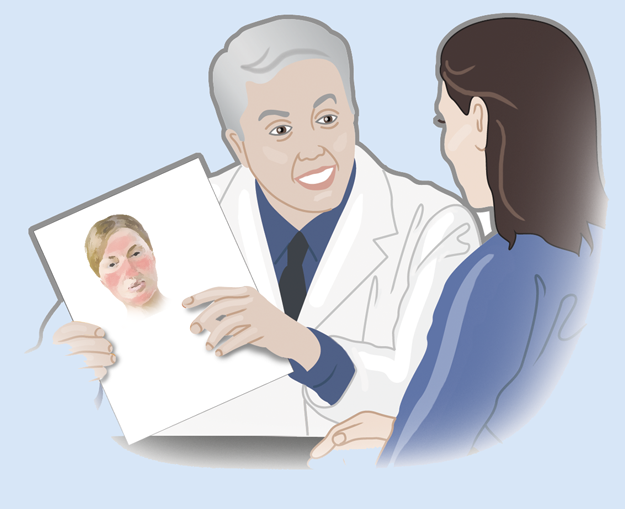Frequently Asked Questions about Psoriasis
HOW LONG DOES PSORISASIS LAST?
 |
Psoriasis is a chronic skin disorder and does not go away, but symptoms can get better for periods of time.1 |
 |
While there is currently no cure for psoriasis, a combination of medical treatments and lifestyle can help control the symptoms.1 |
ARE THERE CERTAIN TRIGGERS I SHOULD AVOID?
 |
Yes—avoiding common triggers as much as possible—including stress, infections, some medications, cold or dry weather, injuries to your skin, sunburns, smoking, and heavy alcohol use—will help reduce your symptoms and make it easier to manage your condition.2,3 |
WILL SPENDING TIME IN THE SUN HELP CLEAR UP MY PSORIASIS?
 |
Exposing the affected skin to small amounts of sunlight can help, but be careful. Too much sun exposure can make symptoms worse or cause outbreaks. Work with your dermatologist and keep a record of exposure time to make sure you do what is best for you. Be sure you cover unaffected skin with sunscreen that is SPF 30 or higher.7 |
WHEN SHOULD I SEE A DOCTOR ABOUT MY PSORIASIS?
- If you or your family doctor suspect psoriasis, you should seek out the advice of a dermatologist. Psoriasis is linked to other serious medical conditions like diabetes, heart disease, and depression. The sooner you start to work with your dermatologist to control your symptoms, the better the outlook for your long-term well-being.3
-

WHAT ARE MY TREATMENT OPTIONS?
 |
There are 3 ways to treat and manage your psoriasis symptoms: topical creams, light therapy, and oral or injected medications. Combining the treatments recommended by your dermatologist with your own management of psoriasis triggers will help you manage your condition and be as symptom-free as possible over the long term.2,3,8 |
CAN PSORIASIS AFFECT OTHER MORE THAN JUST MY SKIN?
- 11-30% of people who are diagnosed with psoriasis also develop psoriatic arthritis. It is important to see a dermatologist if you develop stiff or sore joints, because getting early treatment can help slow the progression.3
- Your nails can become pitted or discoloured. Several people with psoriasis develop symptoms in their nails, and this can be an early warning of the onset of psoriatic arthritis.3,9
REFERENCES
- Psoriasis: Definition. Mayo Clinic. http://www.mayoclinic.org/diseases-conditions/psoriasis/basics/definition/con-20030838. Published 2016. Accessed August 22, 2016.
- Psoriasis. Canadian Dermatology Association. http://www.dermatology.ca/skin-hair-nails/skin/psoriasis/#!/skin-hair-nails/skin/psoriasis/what-is-psoriasis/. Published 2016. Accessed August 22, 2016.
- About Psoriasis. National Psoriasis Foundation. https://www.psoriasis.org/about-psoriasis. Published 2016. Accessed August 22, 2016.
- Psoriasis. National Institute of Arthritis and Musculoskeletal and Skin Diseases. http://www.niams.nih.gov/health_info/psoriasis/psoriasis_ff.asp. Published November 2014. Accessed August 22, 2016.
- Psoriasis: Causes. Mayo Clinic. http://www.mayoclinic.org/diseases-conditions/psoriasis/basics/causes/con-20030838. Published 2016. Accessed August 22, 2016.
- Psoriasis: Risk Factors. Mayo Clinic. http://www.mayoclinic.org/diseases-conditions/psoriasis/basics/risk-factors/con-20030838. Published 2016. Accessed August 22, 2016.
- Psoriasis: Lifestyle and Home Remedies. Mayo Clinic. http://www.mayoclinic.org/diseases-conditions/psoriasis/basics/definition/con-20030838. Published 2016. Accessed August 22, 2016.
- Psoriasis: Treatments and Drugs. Mayo Clinic. http://www.mayoclinic.org/diseases-conditions/psoriasis/basics/treatment/con-20030838. Published 2016. Accessed August 22, 2016.
- Psoriasis: Symptoms. Mayo Clinic. http://www.mayoclinic.org/diseases-conditions/psoriasis/basics/symptoms/con-20030838. Published 2016. Accessed August 22, 2016.
